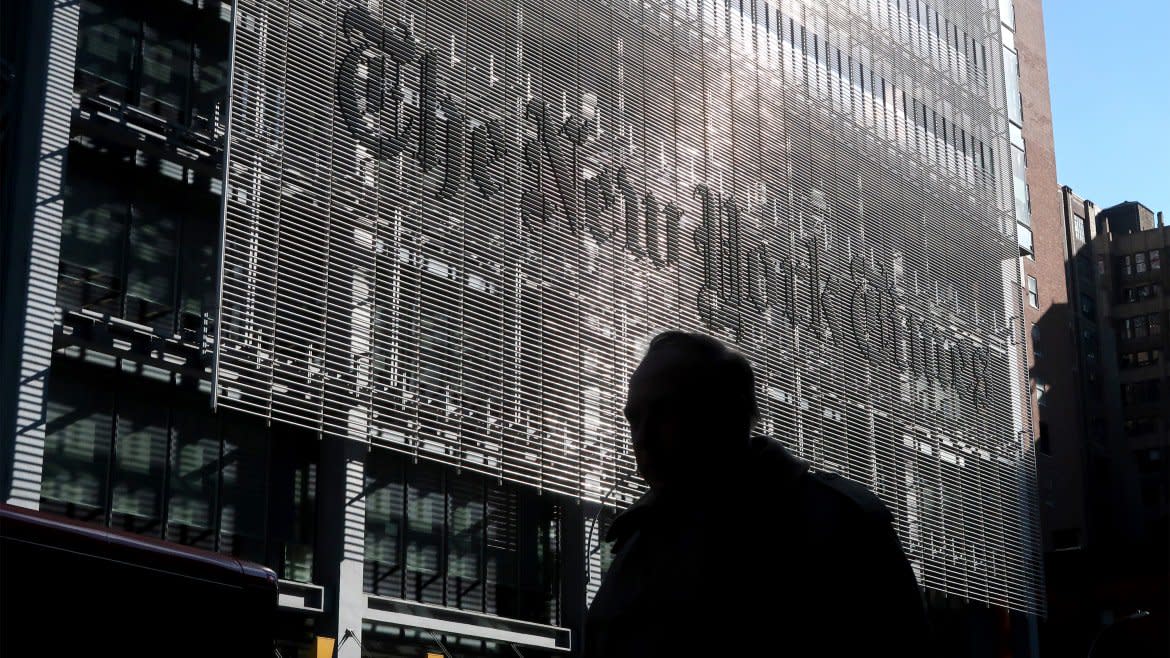New York Times Drops Syndication Service That Supplied Anti-Semitic Cartoon

The New York Times decided on Monday to cease the Times’ relationship with the syndication service that supplied an anti-Semitic political cartoon that ran in last Thursday’s international print edition of the newspaper.
The cartoon, drawn by Portuguese artist António Moreira Antunes and originally published by the Lisbon newspaper Expresso, depicted a blind, yarmulke-wearing Donald Trump being led by a dachshund sporting the face of Israeli Prime Minister Benjamin Netanyahu and a Star of David dog collar.
A Times spokesperson told The Daily Beast exclusively about the paper’s decision to stop using syndicated cartoons, especially from CartoonArts, the New York-based syndicator that has been providing the Times and other newspapers with more than 30 cartoons weekly through the Times Licensing Group for several decades.
The announcement came after The Daily Beast conveyed to the Times a complaint from Jonathan Greenblatt, executive director of the Anti-Defamation League, about a second cartoon published over the weekend in the paper’s international edition.
This one depicted Netanyahu dressed as the Old Testament prophet Moses, sporting sunglasses as he descends from a mountain while holding a selfie stick in one hand and, with the other, hoisting aloft a stone tablet graced by the Jewish star.
“It looked like the Ten Commandments,” Greenblatt told The Daily Beast, “It might not be as blatantly anti-Semitic as the first cartoon, but it was clearly insensitive and absolutely offensive after the first piece of propaganda.”
After a request for comment, Eileen Murphy, the Times’ head of communications, emailed this statement: “The cartoon that ran in the international print edition of The Times last Thursday was clearly anti-Semitic and indefensible and we apologize for its publication. While we don't think this [second] cartoon falls into that category, for now, we've decided to suspend the future publication of syndicated cartoons.”
In an interview, Greenblatt called the newspaper’s apology—which was issued Sunday—“a good start but it’s insufficient,” and added: “We need action and accountability. We don’t need apologies at this point.”
Greenblatt’s criticisms—which he said he’s registered personally to “the leadership of The New York Times”—come at a moment when an apparent white nationalist gunned down Passover worshipers Saturday morning at a Southern California synagogue, wounding several and killing a 60-year-old woman.
The ADL is preparing to issue a report on Tuesday showing an alarming increase in anti-Semitic incidents, year over year, in the United States.
“The New York Times sets the tone of the public conversation,” Greenblatt said, adding that the publication of the first cartoon “is an example of the normalization of anti-Semitism that we worry so much about at ADL. And in an environment where anti-Semitism is on the rise… where people like the shooter this weekend are taking inspiration from these conspiracy theories that Jews have excessive control, that Jews manipulate events—to then see The New York Times publish a piece of propaganda that clearly communicates that Jews have excessive control, or that Jews manipulate events, is unconscionable.”
Greenblatt said that in his conversations with the Times’ leaders, “I’m strongly encouraging them to do more. It’s overdue frankly. We’re going to continue to apply all that we can… There is a deep problem here, and it needs to be dealt with. Standing up to anti-Semitism isn’t something you should after the fact. It needs to happen before there’s an incident… I think the Times needs to take corrective action in advance to ensure that this never happens again.”
The Times initially called publishing Thursday’s cartoon “an error of judgment” but didn’t apologize. But after a storm of criticism, the paper issued a statement saying “we are deeply sorry” and vowed: “[W]e are committed to making sure nothing like this happens again.”
Greenblatt added: “They absolutely need policies and procedures… They need a clarification about how these decisions get made. And the person who would make such a decision to publish a cartoon like that, I think it’s kind of obvious that they don’t have the judgment that’s necessary to be in an institution like the Times… I think they need a thorough review and an overhaul of how those decisions get made. I don’t know, was it one person? Multiple people? I don’t think it’s very clear at this point. This wasn’t a misjudgment, it was a moral failing. It wasn’t a clerical error.”
The Times initially blamed the cartoon’s publication on an unidentified editor who was “working without adequate oversight” because of a “faulty process,” according to a Times story.
Times columnist Bret Stephens also weighed in, writing on Sunday: “The paper owes the Israeli prime minister an apology. It owes itself some serious reflection as to how it came to publish that cartoon—and how its publication came, to many longtime readers, as a shock but not a surprise.”
Greenblatt, for his part, called on Times management to “institute sensitivity training for the staff on anti-Semitism. Clearly they need it, to make sure they cover these issues with an eye toward focusing on the facts rather than perpetuating prejudice. And thirdly, I think they owe it to their readership to educate them on the persistent poison of anti-Jewish hate.”
Murphy declined to comment on Greenblatt’s recommendation to start sensitivity training sessions, or his suggestion that the editor or editors involved shouldn’t be working for the Times.
Got a tip? Send it to The Daily Beast here

